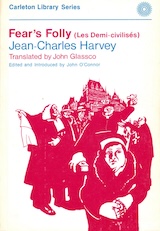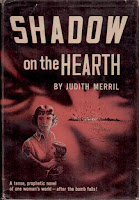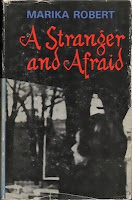Best Man [Doux-amer]
Claire Martin [pseud. Claire Montreuil; trans. David Lobdell]
Ottawa: Oberon, [1983]
Claire Martin turns one hundred today. I can't think of another Canadian literary figure who has joined the ranks of the centenarians. But why focus on such a thing? Longevity is just one of her many accomplishments, as reflected in honours received: the Prix du Cercle du liver de France, the Prix du Québec, the Prix France-Québec, the Governor General's Award, l'Ordre national du Québec and the Order of Canada.
I've not read
Best Man in the original; even if I had my Beaconsfield French is such that I wouldn't have been able to comment on David Lobdell's translation. That said, I imagine the act of translating this work was particularly interesting.
Best Man is a novel written by a woman, translated by a man, featuring a male narrator who in love with a female novelist. And that narrator? His rival is a man who fancies himself a translator. I add that Martin herself has translated Markoosie, Margaret Laurence, Robertson Davies, Clark Blaise and…
I see I'm making the simple confusing.
Martin's straightforward plot begins with the unnamed narrator, an editor at an equally anonymous publishing firm, reflecting back on a twelve-year love affair. Gabrielle Lubin, the object of his affection, enters his life as an aspiring novelist, turning up one day at his office with manuscript in hand. It proves to be a poorly written work, yet our man takes on the arduous task of making it publishable. Why? All these years later he can't quite say:
I fear all these distant memories may have been distorted by subsequent events. The memory, like the heart, is subject to abuse; sometimes, indeed, by the latter.
The collaboration between author and editor leads to passion, most of which emanates from the latter. Gabrielle places her writing above all else. Critical and commercial success, both quick to come, change little in her life and lifestyle; she maintains routine, to which our narrator happily conforms. Separate flats are maintained, marriage is never discussed.
Jarringly, the regular and familiar is disturbed by a young dilettante who whisks Gabrielle from cocktail party to bed to the altar. The novelist knows that she has made a mistake, but does her best to prolong the doomed marriage by appealing to her editor. Our man, her former man, publishes the husband's passable novel and a weak translation of one of Gabrielle's works in order to maintain contact and chart the disintegration.
As one would expect with stories of obsessive love – Nabokov comes to mind – the narrator defers. 'Tis
Lolita, not
Humbert. This Montreal Anglo, incompetent in French, takes issue with David Lobdell's title:
Best Man for the Claire Martin's
Doux-amer (
Bitter-sweet).
It is Gabrielle Lubin, not the narrator, who is the central character. She is a new woman, set in print the very year that the Quiet Revolution began. Unlike any that came before – I'm looking at you Angéline de Montbrun and Maria Chapdelaine – she is self-assured. She commands.
Who can resist?
Object: Published simultaneously in paper and cloth. My copy, an example of the former, was purchased in 1985 from a bookseller located on the Westmount stretch of Sherbrooke Street. Can't recall the name of his store, though I do remember his price: $2.00.
Access: David Lobdell's translation enjoyed just one small printing. Four copies are currently listed for sale online, though only two are worth consideration: a Very Good paper copy at US$23.00 and a Fine cloth copy (sans dust jacket) at US$40.25.
Beware the Ontario bookseller who dares list an ex-library copy as "Good".
This is simply not possible, as further description proves: "Covered in Mylar; one stamp on back page, and with tape holding mylar to book. Stain on end pages of book where dirty fingers opened it, and on pages where DJ tape touches paper. One library tape on page 5." Ugh.
While
Best Man is held by most of our university libraries, only Library and Archives Canada, the Bibliothèque et Archives nationales du Québec and the Vancouver Public Library serve those outside the world of academe.
Doux-Amer is better represented, in part due to the fact that it is still in print thanks to the fine folk of the Bibliothèque Québécoise.
I add that at C$9.99 it is a bargain.
And isn't that cover image great?










.jpg)













































